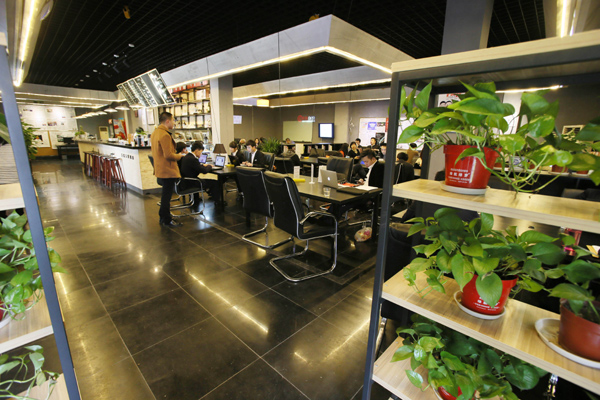Startups upstage SOEs for jobs
Entrepreneurship key motivator in shifting emphasis toward employment, say experts
For decades, the most coveted jobs in China have been in government, with their steady income, job security and power. Now people like Nymar Li are changing that perception by leaving government jobs to seek their fortunes at startups.
Li became the pride of his family when he landed a job in the customs bureau right out of college a decade ago. Then last year, he gave up the security of employment for life to join an e-commerce startup working in Hangzhou, following the path of Jack Ma who helped found Alibaba Group Holding Ltd in the same city and then pulled off the largest initial public offering ever.
It is a sign of a broader shift in China as the economy slows and state-backed companies falter. People like Ma are inspiring a generation to become entrepreneurs and seek their fortune in the private sector, just as a crackdown on corruption makes it less prestigious and lucrative to be a civil servant.
"The brightest of our generation no longer yearn to be in the system," said the 34-year-old Li. "As long as you have the caliber, there's a real possibility you can make it in the market."
The number of people taking the civil entrance exam fell to a record low, down 7.5 percent to 1.4 million, according to the State-run People's Daily.
Liu Yuan, an investment manager at ZhenFund, sees the shift through the startups he backs. Last year, the Beijing-based angel investor pumped $70 million into 100 startups, with about half of his most recent investments founded by college graduates born after 1985.
"Kids these days no longer find going into government on top of their list," said the 26-year-old Liu. "Setting up their own startups is what they have their eyes on."
New businesses are sprouting at a record pace, with China's version of Silicon Valley birthing 49 startups a day last year. More than 1,000 organizations are investing in startups with capital exceeding 350 billion yuan ($56 billion), according to the ministry of science and technology.
"There is a ton of money looking for places to go," said Michael Pettis, a finance professor at the Guanghua School of Management at Peking University. "It is not surprising that a lot of startup companies want to take advantage of this."
Nymar Li decided on a path into civil service in part because of his parents, who both worked at State-owned enterprises. After graduating from university in Zhejiang province in 2003 he sat for the government entrance exam and joined the customs bureau.
"As someone who was just normal, went to school normally and actually became a civil servant without needing my parents to call in any favor, it made my entire family very happy," said Li. "They felt I was on a right track."
That sentiment faded over the years as stagnant pay made it increasingly difficult to care for his young family and elderly parents. Nymar struggled to maintain a middle-class lifestyle on his 9,000 yuan monthly government salary, as annual inflation averaged almost 3 percent.
The shrinking benefits and influence for civil servants also helped make up his mind. He ultimately decided to join a business importing overseas goods to China.
"There has been a real initiative to limit the power and interference government officials have on corporations, which leads to a drastic decrease in feelings of achievement," said Li.
He left government about the same time five colleagues departed for the private sector. Kong Xuan, 35, is another former civil servant in Jiangxi province now setting up his own Internet finance startup in Hangzhou.
"The biggest difference is now I am a lot happier," said Kong. "The Internet industry is much more vital."
As a new generation emerges who are not as tied to the government, the government is pondering on steps to retain control, said Isaac Mao, an angel investor and founder of smart device maker Aivvy Inc.
"There's an inherent conflict in all of this," said Mao. "To think that you can have true innovation and a thriving technology sector but not give up power to some extent is delusional."
Already change is under the way as young people who have gained success overseas return to China.
Hou Yu, a 26-year-old former Goldman Sachs Group Inc. banker, returned to the mainland from Hong Kong last year to set up her own online finance firm. She is focused on working with small and medium enterprises.
"China's current technology boom is intertwined with reform in finance and politics and energy, environment and health care," said Hou, who graduated from New York University with a master's degree in mathematics. "This is a very powerful process and it is all very exciting."
For Nymar Li, the trend away from the civil service can only have positive benefits on his generation. They have the opportunity to create and help improve the country.
"These people are the best and brightest," said Li, "and bright people are restless."
|
 More than 100 young people placed orders or negotiated with customers at the Pioneer Angel Cafe in Nanchang, Jiangxi province, on March 25.The cafe is an Internet startup service platform, aiming to help the youth and college students start their own businesses. Zhu Wenbiao / for China Daily |


















